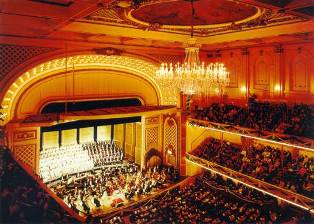
Haydn's "Seasons" Mirrors Life

Haydn was 69 when he finished his oratorio, "The Seasons" in 1801, not quite as old as the Cincinnati May Festival (134) but feeling his mortality nonetheless (he died eight years later in 1809).
In a way, it was his life story, combining seriousness and reflection with his trademark humor and down-to-earth humanity.
May Festival music director James Conlon, the May Festival Chorus and a trio of splendid soloists opened the 2007 May Festival Friday night at Music Hall with a performance of the work that adhered to Haydn's vision in every way. The work is not as immediately appealing as his earlier oratorio "The Creation," but it is a beauty unto itself, true to its text (which after all, lacks the punch of the Genesis story) and representative of the composer's mature mastery
The opening movement, "Spring," didn't sound like it at first, since the introduction descends darkly in a minor key, but baritone Brian Mulligan, as the farmer Simon, set the record straight with his "See, how harsh winter flees," and it wasn't long before spring "rushed in" on Ellie Dehn's sweet, nimble soprano as Simon's daughter Hanne.
Conlon utilized a reduced orchestra (24 strings plus pairs of winds and brasses, timpani, percussion and harpsichord), achieving a congenial blend with the soloists and 120-voice chorus. Ensemble was excellent, give or take a few scrappy moments in the strings, particularly during the first half. The soloists' voices projected beautifully (though tenor John Aler's lowest notes were a bit grainy and weak) and balances and enunciation were superb in the chorus. Mulligan, Dehn and Aler all had the requisite coloratura and sang with beauty of tone and expressivity.
Each movement had its own character and moments to relish, beginning with "Early goes the ploughman" in "Spring," where smiles bloomed throughout the hall upon hearing Haydn's self-quotation of the Adagio from his "Surprise" Symphony frosted with piccolo.
"Summer" is a sterner season, whose introduction seems to shimmer with heat though it isn't even sunrise. The sun rose without quite the magnificence of "Es war licht" ("there was light") in "The Creation, where light is seen for the first time, but joyously enough. Dehn had a lovely moment with her sylvan aria "How welcome is the shaded grove," where oboist Lon Bussell provided an eloquent shepherd's pipe. The storm, a precursor of Beethoven's in his "Pastorale" Symphony, raged to a quiet end, with a "true-to-life" quail and crickets chirping in the woodwinds and a blissful Austrian ländler "good night."
"Autumn" is the glory of Haydn's "Seasons," where he lets his hair down and lets the country folk revel. Mulligan, a real find with his mellow, butterscotch voice, went "hunting" with his dog, who sniffed furiously (bassoonist Marty James) before his master brought hs prey down with a "shot" in the timpani. Aler as the farm boy Lukas sang a lilting love duet with Dehn, reminiscent of Adam and Eve's duet in "The Creation."
The hunting chorus that followed featured exuberant playing by hornists Tom Sherwood and Gene Berger, while the final drinking chorus worked to a tipsy conclusion, complete with hearty upward accents on "Juh, Juh" ("Hooray" for the wine).
"Winter" clearly offered a foreshadowing of death as Simon asked what lasts in life ("virtue only"). Aler shone in his picture of a wanderer lost in the snow. Dehn provided a bit of arch levity as a maiden who steals a nobleman's horse to escape his clutches, followed by a mirthful chorus peppered with "ha ha's."
The oratorio concluded on a note of affirmation, as the chorus sang of trust in redemption and the afterlife, sealed by two firm "Amen's."
The festival continues at 8 p.m. tonight at Music Hall with a concert performance of Verdi's "Il Trovatore."
(first published in The Cincinnati Post May 19, 2007